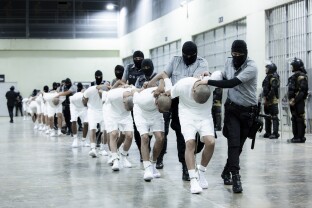The Justice Department finds itself right back where it was in the spring, in the uncomfortable position of having to explain why Trump administration officials ignored a judge’s order to halt rushed deportation flights of so-called “alien enemies” to a Salvadoran prison in March.
After two detours to appellate courts, D.C. Chief Judge James Boasberg picked up where he left off: contemplating contempt proceedings against top government officials — and demanding to know who disregarded his time-sensitive orders.
In court on Wednesday, Boasberg started the hearing by saying he would explore “whether there’s sufficient information to make a contempt referral” — which would mean appointing an independent prosecutor to investigate government officials.
Tiberius Davis, a DOJ lawyer, refused to budge — attempting to object to “any further proceedings on criminal contempt” while wrongly claiming that an appellate court had opposed going down that road. But the judge quickly shut that down, demanding sworn statements of “everybody involved” in the rushed deportations on March 15 and those “who gave the orders to defy my ruling.”
Boasberg also said he’d soon have Trump administration officials testify in court, starting with a fired DOJ lawyer-turned-whistleblower and the deputy assistant attorney general overseeing the DOJ’s immigration office, Drew Ensign — and possibly moving on to more senior officials across the federal government.
“I don’t think hauling high-level officials ... into court would be an appropriate first step,” Davis protested.
Boasberg said he’d start with declarations that might remove “the need to call certain witnesses,” but he showed no indication of hesitating on an investigation that could spell serious legal trouble for DOJ leadership — and possibly even the White House.
“I intend to proceed exactly as I did in April — seven months ago,” he said, adding that he expects to have witnesses testify about exactly what happened behind closed doors in the Trump administration.
The passage of time while the matter was on appeal was something of a temporary win for President Donald Trump. An estimated 200 Venezuelans who were surreptitiously whisked to El Salvador’s Terrorism Confinement Center, CECOT, have already been released to Venezuela — which made the matter seem moot, despite claims from the men that they’d been tortured during their stay at the notorious prison.
But the past seven months have also brought revelations about a purported DOJ directive, issued on the eve of the March 15 flights, to outright ignore any judge who tries to intervene. In June, a government lawyer who lost his job for raising internal concerns about the matter became a whistleblower. Erez Reuveni, who handled major administration deportation efforts as acting deputy director of the DOJ’s Office of Immigration Litigation, claimed that Emil Bove — a Trump lawyer who was then a high-ranking DOJ official — told government lawyers behind closed doors that prosecutors would need to consider telling judges “fuck you.”
Having successfully put the contempt fight on ice with appeals, the Trump administration never turned over a list of officials who orchestrated the March flights and refused to turn them around.
But Reuveni’s whistleblower complaint to Congress serves as a play-by-play that could guide the court’s inquiry.
That 35-page letter details what Reuveni called “internal efforts of DOJ and White House leadership to defy [court orders] through lack of candor, deliberate delay, and disinformation.” He claimed Ensign “willfully misled” Boasberg about the location and status of the planes during the tense Saturday evening court hearing.
And Reuveni also asserted that top lawyers at the Department of Homeland Security and the Department of State “ignored” his emails that quickly notified them about the court order halting removal flights. He pointed to nine emails that went unanswered — save for a late-night response from DHS that it wouldn’t even issue an internal guidance to agents until they heard back from Attorney General Pam Bondi.
Among those in the loop were Yaakov Roth, a top lawyer in the DOJ’s civil division; James Percival, then a “senior counselor” to DHS Secretary Kristi Noem and currently the nominee to be the department’s general counsel; and acting DHS general counsel Joseph Mazzara.
Reuveni’s letter also touches on Bove’s personal involvement, pointing to a quickly formulated-then-nixed plan to have Bove appear in court to defend the Trump administration’s decision to ignore the judge’s order as an alternative “interpretation” of the law.
Bove is now an appellate judge in the Third Circuit, which oversees cases in Delaware, New Jersey, Pennsylvania, and the Virgin Islands.
Reuveni’s phone records, emails, and text messages have now been submitted as evidence in the ongoing case. On Wednesday, Boasberg said he “would like to hear from” Reuveni himself.
Sign in
Log into your free account with your email. Don’t have one?
Check your email for a one-time code.
We sent a 4-digit code to . Enter the pin to confirm your account.
New code will be available in 1:00
Let’s try this again.
We encountered an error with the passcode sent to . Please reenter your email.


